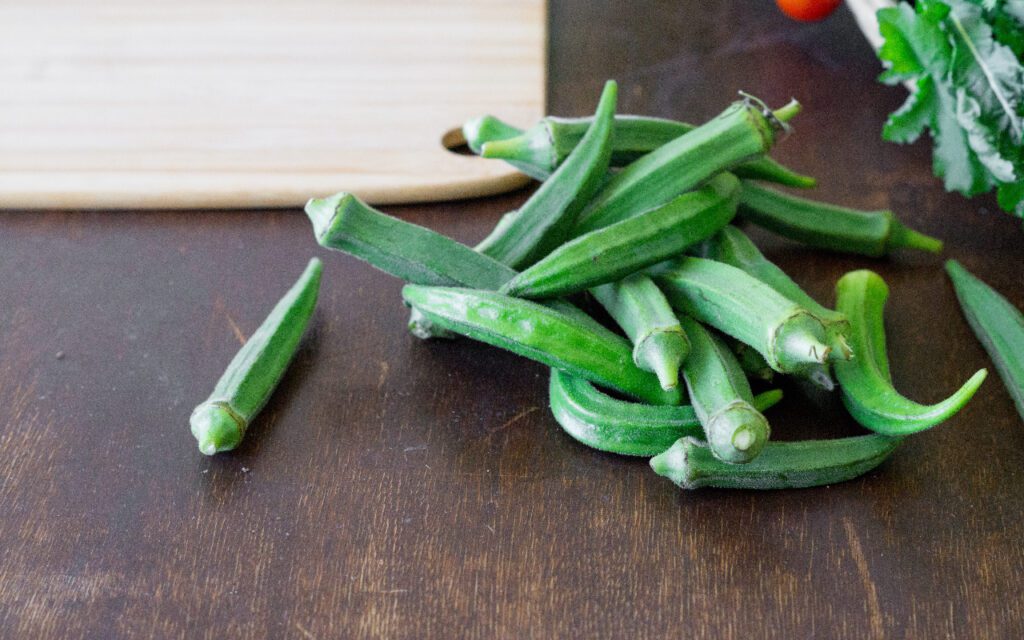If you’re a dog owner and a fan of okra, you may be wondering whether or not you can treat your furry friend to this nutritious vegetable.
Okra, also known as lady’s fingers, is a popular ingredient in many cuisines due to its unique flavor and health benefits.
However, when it comes to feeding your dog, it’s important to be cautious and informed about what you’re giving them.
In this article, we’ll take a closer look at whether dogs can eat okra and what you need to know before sharing this vegetable with your furry friend.
Can Dogs Eat Okra?

Yes, dogs can eat okra. Okra is a safe and non-toxic vegetable for dogs to consume in moderation. It is packed with essential vitamins and minerals that can benefit your pup’s health.
Okra contains folic acid, which helps with normal metabolic processes in the body. Additionally, it is a good source of fiber, which helps support digestion and regularity. It also provides immunity-boosting nutrients that help keep your pup healthy.
When feeding okra to your dog, make sure to rinse it off before letting them chew on it. Also, serve it plain without added fats or salt as these can be unhealthy for your pup.
Moderation is key when feeding okra to your pet – too much can cause digestive issues like gas and bloating.
Overall, okra is a great snack for your pup if given in moderation and prepared properly!
See also: 47 Safe Vegetables To Feed Your Dog. Puppy Power!
How Much Okra Can Dogs Eat?

While okra is generally safe for dogs to eat, it should be given in moderation as a treat or supplement to their regular diet. As a rough guideline, dogs can have 1-3 small pieces of plain, raw okra as a snack.
This amount can vary depending on the size of your dog. As a general rule, dogs should not consume more than 10 percent of their daily calorie intake in the form of treats.
In terms of ounces, it’s difficult to give an exact amount as the weight of okra can vary depending on its size. As a reference point, one average-sized okra pod typically weighs around 0.5 to 1 ounce.
It’s always best to err on the side of caution and consult with your veterinarian if you have any concerns about feeding your dog okra or any other new foods.
Remember that moderation is key – too much okra can cause digestive problems such as gas, bloating, or diarrhea.
Okra Feeding Chart According To Size
| Food | Size | Portion |
|---|---|---|
| Okra | Toy dogs | 1 piece |
| Okra | Small dogs | 1 piece |
| Okra | Medium dogs | 1-2 pieces |
| Okra | Large Dogs | 1-3 pieces |
Okra Feeding Chart According To Age
| Food | Age | Portion |
|---|---|---|
| Okra | 0 – 6 months | Don’t feed |
| Okra | 6 – 12 months | 1 piece |
| Okra | 12 – 24 months | 1-2 pieces |
| Okra | 24+ months | 1-3 pieces |
How Often Can Dogs Eat Okra
The frequency at which you feed okra to your dog depends on several factors like their size, weight, activity level, and overall health.
In general, it is recommended to feed okra to your dog only once or twice a week as an occasional treat or supplement to their regular diet.
If you see any signs of digestive distress such as vomiting, diarrhea, or abdominal pain after feeding your dog okra, it’s best to stop feeding it to them and consult with your veterinarian.
It’s important to keep in mind that okra should not be a replacement for a balanced and complete dog diet. Make sure your dog’s main diet consists of high-quality dog food that meets its nutritional needs.
Health Benefits of Okra To Dogs
- Rich in Vitamins and Minerals. Okra contains high levels of essential vitamins and minerals such as folate, vitamin C, vitamin K, calcium, and potassium which are beneficial for your dog’s health.
- Improves Digestion. Okra has a high fiber content that helps regulate digestion and promote regular bowel movements in dogs. This makes it an excellent snack to help with constipation issues.
- Supports Immune System. Okra contains antioxidants such as beta-carotene and quercetin that help boost the immune system in dogs. This means that it can help your dog fight off infections and diseases.
- Good for Weight Management. Okra is a low-calorie vegetable that helps keep your dog feeling full without excessive weight gain. It’s a smart choice for a healthy snack.
- Anti-Inflammatory. The high antioxidant content in okra has anti-inflammatory properties that can help reduce inflammation and joint pain in dogs.
- Lowers Cholesterol. Okra is rich in soluble fiber which helps to reduce cholesterol levels in dogs, which can lower their risk of developing heart disease.
Potential Risks Of Feeding Okra To Dogs
- Digestive Problems. While okra is generally safe for dogs, feeding too much of it can cause digestive issues such as bloating, gas, and diarrhea. It’s important to feed okra to your dog in moderation as a treat or supplement to their regular diet.
- Choking Hazard. Okra can be a choking hazard for dogs, especially if it’s not cut into small pieces. Always supervise your dog while they are eating okra and make sure it is in a size that can easily be broken down.
- Allergic Reactions. While dogs are rarely allergic to okra, it’s still important to monitor your dog for any allergic reactions after feeding them new foods. Some dogs may have an allergic response to certain foods or vegetables, and okra can be one of them.
- High Sodium Content. Some okra-based recipes or commercial brands of okra may contain high levels of sodium which can be harmful to dogs in large quantities. Always read the label and check the sodium content before feeding okra to your dog.
- Unripe Okra. Unripe okra pods can be difficult for dogs to digest and may cause gastrointestinal problems. It’s best to feed your dog only fully ripe and fresh okra pods.
Nutritional Benefits of Okra For Dogs
| Okra Nutrition Facts per 100 grams | % DV * |
|---|---|
| Calories | 33 |
| Total Fat | 0.2 g |
| Cholesterol | 0 mg |
| Sugar | 1.5 g |
| Glycemic Index | 20 |
| Sodium | 7 mg |
| Carbs | 7 g |
| Protein | 1.9 g |
| Vitamin D | 0% |
| Calcium | 8% |
| Iron | 3% |
| Potassium | 299 mg |
Are Dogs Sensitive To Okra?
While it is rare for dogs to be allergic to okra, some dogs may be sensitive to it, resulting in certain symptoms. Symptoms of okra sensitivity in dogs may include:
- Itching and scratching
- Red, inflamed skin
- Hives or rashes
- Swollen face, tongue, or muzzle
- Vomiting or diarrhea
- Difficulty breathing, especially if the throat swells
If you suspect your dog may be sensitive to okra, it’s important to stop feeding it to them right away and contact your vet. They may perform tests to determine your dog’s sensitivity to okra and advise on the best course of action for your pup.
Again, it’s important to note that the risk of a dog being allergic or sensitive to okra is rare. However, if you notice any of the above-listed symptoms after feeding your dog okra, discontinue it, and seek medical attention from a veterinarian as soon as possible.
How To Prepare Okra For Dogs
Raw Okra
One of the simplest ways to prepare okra for your dog is to serve it raw. Rinse the pod thoroughly and trim off the stem end. Cut the okra into bite-sized pieces and let your dog crunch away. Ensure that the piece size is appropriate for your dog’s size to prevent choking hazards. You can also mix it into their meals.
Baked Okra Chips
Make healthy okra chips by slicing okra into thin rounds, drizzling them with olive oil, and baking them in an oven at 400°F for 10-15 minutes or until they are crispy. Baked okra chips are a great alternative to store-bought dog treats.
Boiled or Steamed Okra
Boiling or steaming okra is another simple and easy way to prepare it for your dog. Boil or steam the okra for 5-7 minutes until it is tender. Let it cool down and serve it to your pup.
How Fast Will Dogs Digest Okra
The digestion time of okra in dogs can vary depending on factors such as their size, breed, age, and overall health. Generally, it takes between 4-6 hours for dogs to digest okra.
However, digestion time can be prolonged if your dog consumes a large quantity of okra at once or if they have an underlying digestive issue. This can lead to digestive problems like bloating, gas, and diarrhea.
It’s important to feed okra to your dog in moderation and pay attention to their reaction after consuming it. If you notice any signs of digestive distress, such as vomiting or diarrhea, discontinue feeding okra to your dog and consult with your veterinarian.
Overall, okra is a safe and healthy vegetable for dogs to consume in moderation, but it’s important to keep an eye on their reaction and adjust accordingly.
FAQs
Can dogs eat okra seeds?
Yes, dogs can eat okra seeds. Okra seeds are a great source of dietary fiber, vitamins, and minerals that provide health benefits to your pup. The vitamin C in okra helps keep their immune system strong, while dietary fiber aids digestion.
Can dogs eat okra leaves?
Yes, it is safe for dogs to eat okra leaves. Okra leaves are packed with vitamins and minerals that can be beneficial for your pup’s health. They are also high in fiber, which can help support a healthy digestive system.
In Conclusion
In conclusion, dogs can eat okra, and it offers several health benefits such as providing essential nutrients, improving digestion, and boosting the immune system.
This vegetable is generally safe for dogs to consume, but as with any new food, it’s best to introduce okra to your dog slowly and in moderation.
It is recommended that portions of okra given to dogs should be limited, cut into small pieces to prevent choking, and serve plain, with no additives such as salt or seasonings.
Additionally, it’s a good practice to monitor your dog’s reaction to okra, and if you notice any signs of digestive distress or an allergic reaction, discontinue feeding it and contact your veterinarian.





Leave a Reply